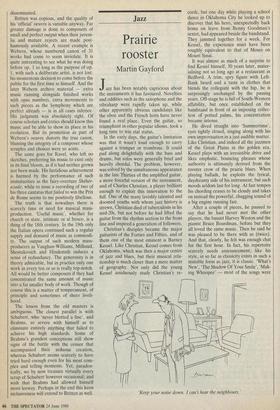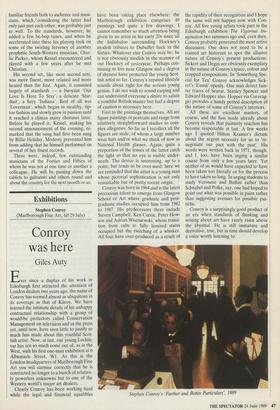Jazz
Prairie rooster
Martin Gayford
Jazz has been notably capricious about the instruments it has favoured. Novelties and oddities such as the saxophone and the vibraharp were rapidly taken up, while other apparently obvious candidates like the oboe and the French horn have never found a real place. Even the guitar, so triumphant in other popular idioms, took a long time to win star status.
In the early days, the guitar's limitation was that it wasn't loud enough to carry against a trumpet or trombone. It could pad along delightfully with the bass and drums, but solos were generally brief and heavily chordal. The problem, however, was solved by the simultaneous appearance in the late Thirties of the amplified guitar, a more forceful version of the instrument, and of Charles Christian, a player brilliant enough to exploit this innovation to the full. One of the many lavishly talented and doomed youths with whom jazz history is strewn, Christian died of tuberculosis in his mid-20s, but not before he had lifted the guitar from the rhythm section to the front line and inspired a generation of followers.
Christian's disciples became the major guitarists of the Forties and Fifties, and of them one of the most eminent is Barney Kessel. Like Christian, Kessel comes from Oklahoma, which was then a major centre of jazz and blues, but their musical rela- tionship is much closer than a mere matter of geography. Not only did the young Kessel assiduously study Christian's re- cords, but one day while playing a school dance in Oklahoma City he looked up to discover that his hero, unexpectedly back home on leave from Benny Goodman's sextet, had appeared beside the bandstand. They jammed together for a week. For Kessel, the experience must have been roughly equivalent to that of Moses on Mount Sinai.
It was almost as much of a surprise to find Kessel himself, 50 years later, mater- ialising not so long ago at a restaurant in Bedford. A trim, spry figure with Left- Bank beard and a taste in clothes that blends the collegiate with the hip, he is surprisingly unchanged by the passing years. Off-stage he is full of South-Western affability, but once established on the bandstand in front of an imposing collec- tion of potted palms, his concentration became intense.
He dived straight into 'Summertime', eyes tightly closed, singing along with his own improvisation in a just audible mutter. Like Christian, and indeed all the jazzmen of the Great Plains in the golden era, Kessel plays with an irresistible drive and likes emphatic, bouncing phrases whose authority is ultimately derived from the rooster crow of the prairie blues. When playing ballads, he exploits the lyrical, daydreamy side of his instrument; but such moods seldom last for long. At fast tempos his chording ceases to be cloudy and takes on instead the powerful, chugging sound of a big engine running fast.
After a couple of pieces, he paused to say that he had never met the other players, the bassist Harvey Weston and the pianist Bruce Boardman, before but they all loved the same music. Then he said he was pleased to be there with us (twice). And that, clearly, he felt was enough chat for the first hour. In fact, his repertoire scarcely needs announcement; like his style, in so far as classicity exists in such a mutable form as jazz, it is classic. 'What's New', 'The Shadow Of Your Smile', 'Mak- ing Whoopee' — most of the songs were 'Keep your noise down. I can't hear the neighbours.' familiar friends both to audience and musi- cians, which,' considering the latter had only just met each other, was probably just as well. To the standards, however, he added a few be-bop tunes, and when he accelerated into these his playing took on some of the swirling fervency of another prophetic South-Western musician, Char- lie Parker, whom Kessel encountered and played with a few years after he met Christian.
His second set, like most second sets, was more fluent, more relaxed and more heated than the first. Again, it consisted largely of standards — a buoyant 'Our Love Is Here To Stay'; a delicate `Star- dust', a fiery 'Indiana'. Best of all was `Loverman', which began in stealthy, tip- toe fashion and slowly grew in passion until it reached a climax many choruses later. Before he played it, Kessel, making his second announcement of the evening, re- marked that the song had first been sung by Billie Holiday. Modesty prevented him from adding that he himself performed on several of her finest records.
There were, indeed, few outstanding musicians of the Forties and Fifties of whom he was not at one time or another a colleague. He will be passing down the tablets to guitarists and others round and about the country for the next month or so.











































































 Previous page
Previous page